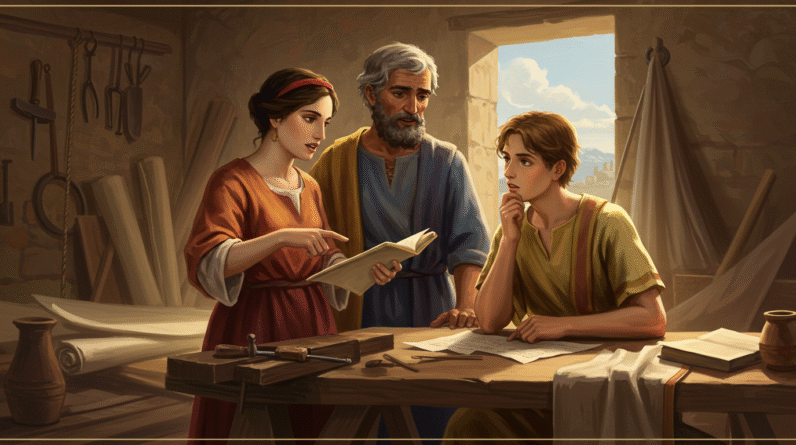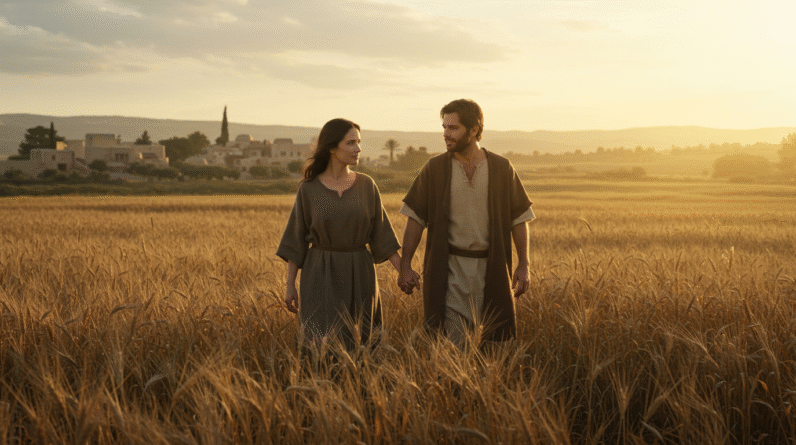How Abraham And Sarah Teach Us Patience In Marriage
You’re about to walk through a story that’s both ancient and deeply practical — the story of Abraham and Sarah. When you read their lives, you won’t just find historical facts; you’ll find marriage lessons that speak directly to your waiting, your fears, and your faith. These Abraham and Sarah marriage lessons aren’t abstract theology; they’re lived-out principles that help you grow patient, hopeful, and faithful in the middle of marriage struggles.
Why their story matters to your marriage
Abraham and Sarah lived with promises, delays, doubts, and a surprising God who honored His timing. When you face unfulfilled dreams or seasons of waiting in your marriage, their story shows you what it looks like to keep trusting one another and God. The Bible gives you snapshots of their faith and failures so you can learn without paying the same price.
A quick look at the biblical timeline
You’ll want to see their story in the Scriptures as you think about the patience needed in marriage. Start by reading Abraham’s call and God’s promise in Genesis 12:1-3. Later, God reiterates the promise in Genesis 15:1-6, and Sarah’s struggle with waiting is clear in the account of Hagar in Genesis 16:1-4. God renames Sarai to Sarah and promises a son in Genesis 17:15-19, and the miraculous birth of Isaac finally arrives in Genesis 21:1-2. Paul and the author of Hebrews point to their faith in Romans 4:18-21 and Hebrews 11:11. These passages are your map for the lessons that follow.
Lesson 1: Patience grows out of promise
You’re more likely to wait patiently when you’re anchored to a promise. Abraham and Sarah didn’t invent waiting; they were waiting on a promise God Himself had spoken. That promise shaped how they understood their future, even when external circumstances made no sense.
When God promised Abraham descendants as numerous as the stars, he had something to hold on to. You need promises — from God and from one another — to sustain patience in marriage. When you and your spouse commit to “for better or worse,” you’re making a promise that fuels long-term endurance. The deeper your confidence in God’s faithfulness and in each other, the easier it becomes to bear seasons of delay.
Lesson 2: Waiting reveals character, not just timing
Waiting is a test. It reveals what’s already in your heart and molds what’s not yet there. Abraham and Sarah’s long wait exposed both faith and weakness. You should expect your character to be refined as seasons of waiting press against you and your spouse.
The temptation is to blame waiting for your problems, but the better posture is to ask how waiting is changing you. Are you growing in gentleness? Are you learning to listen? Waiting humbles you, and humility is essential to a healthy marriage. When you measure the health of your marriage, don’t just count the years or joys; measure the growth in patience, kindness, and dependence on God.
Lesson 3: Impatience has consequences — the Hagar story
You can’t read the story of Abraham and Sarah without seeing the fallout from impatience. Sarah suggested that Abraham sleep with Hagar to produce a child when she felt the promise was stalled. That decision led to jealousy, division, and long-term strife that echoed through generations.
When you take matters into your own hands in marriage, thinking you’ll shortcut God’s plan, you risk creating scars that last. The consequences of impatience aren’t always immediate; often they’re relational wounds that take years to heal. If you’re tempted to force outcomes — whether through manipulation, secrecy, or unilateral decisions — remember the Hagar episode and consider the long-term costs.
Lesson 4: You’re partners in waiting
Patience in marriage isn’t a solo discipline. Abraham and Sarah had to navigate waiting together, even when they disagreed about the best path. That partnership is an essential model for you: waiting is healthier when you’re united.
You should cultivate shared spiritual practices that shape your joint trust in God. Praying together, reading Scripture together, and making covenantal decisions together make the wait less lonely and more meaningful. When you align your expectations and agree to trust God as a team, you build resilience that outlasts seasons of discouragement.
Lesson 5: Honest communication prevents compounding problems
When Sarah lost patience, she made a hard choice without fully grappling with its implications alongside Abraham. Your marriage will benefit when you choose communication over unilateral action. Even difficult conversations are better than decisions that create relational fallout.
You should commit to speaking truth in love. That means naming fears, expressing desires, and listening for God’s leading together. Honest communication doesn’t mean you’ll always agree, but it does mean you’ll avoid some of the regrets that come when you act alone.
Lesson 6: God’s timing is not your timing
You need to internalize this truth: God isn’t late, He’s sovereign. Abraham and Sarah experienced delays that felt unbearable, but God’s timing was perfect for the promise to be fulfilled. Your impatience misses the way God works to shape deeper trust, prepare hearts, and orchestrate outcomes beyond your sight.
When you’re tempted to rush, remind yourself that God is working in unseen ways. The delay may prevent something worse, or it may prepare you for blessings you didn’t know you needed. Trusting God’s timing helps you stay patient and hopeful, even when circumstances scream for immediate action.
Lesson 7: Faith sometimes looks foolish to the world
When God told Abraham he would have a son in his old age, people laughed. Sarah herself laughed when she first heard the news. Yet faith often requires you to stand against cultural expectations.
You should expect skepticism from the world, but that doesn’t mean you abandon the promise. If your marriage is countercultural in how it waits — prioritizing faith over instant gratification — be ready for misunderstanding. Your goal isn’t to please everyone; it’s to honor God and love your spouse well.
Lesson 8: Repentance and restoration are possible
You don’t have to carry shame forever for decisions made in impatience. Abraham and Sarah’s story includes failure, but it also points to God’s grace. Even after the Hagar episode, God remained faithful to the promise and to His relationship with Abraham and Sarah.
You should practice repentance and seek restoration when impatience damages your marriage. Confess, ask forgiveness, and take concrete steps to rebuild trust. God’s forgiveness opens the door for you to repair what’s been broken and to build a stronger union out of the ashes of your mistakes.

Lesson 9: Patience opens the way for miracles
The miraculous birth of Isaac wasn’t just a medical anomaly in the narrative; it was the fruit of patience and God’s covenant faithfulness. When you exercise patience in marriage, you create space for God to bring about things that your effort alone cannot achieve.
You should expect God to move in powerful ways — sometimes through small steps of obedience, sometimes through dramatic interventions. The key is to stay faithful as you wait, trusting that God is working even when you don’t immediately see the outcome.
Lesson 10: Pray with endurance
Prayer was the steady drumbeat in Abraham and Sarah’s life. Your prayer life together will sustain you through delays and disappointments. Persistent prayer shapes your heart and aligns your desires with God’s will.
You should make prayer a daily habit in your marriage. Prayer isn’t just about asking for solutions; it’s about deepening your relationship with God together. When you pray, you invite God into the waiting room of your life, and that posture reduces anxiety and fuels patience.
Lesson 11: Worship recalibrates your perspective
Worship is a powerful corrective when waiting becomes frustrating. Abraham and Sarah worshipped and made altars in their journey, signaling surrender to God’s plan. Worship reminds you that God deserves your trust even when outcomes are delayed.
You should cultivate worship together — corporate worship, private worship, and simply praising God in hard seasons. Worship shifts your focus from what you lack to who you have. That perspective fosters patience, gratitude, and a deeper love between you and your spouse.
Lesson 12: Guard against comparing your timeline to others
One of the enemies of patience is comparison. Sarah looked around at other wives and options; you’re tempted to measure your marriage by someone else’s wedding photos, ministry success, or family life. That comparison breeds discontent.
You should learn to celebrate others without letting their timelines define your hope. God’s plans for your marriage are unique. Comparing steals joy and short-circuits the patience you need to receive God’s best in your particular story.
Lesson 13: Turn waiting into worship through stories of faith
Scripture invites you to sit with stories like Abraham and Sarah’s, so you can be encouraged. The author of Hebrews points to their faith as an example for you in Hebrews 11:11. When you meditate on their endurance, you’re training your heart to trust God longer and deeper.
You should immerse yourself in testimonies that fuel hope. Reading about other couples who waited well can reshape your expectations and give you practical models to follow.
Lesson 14: Make covenantal promises that outlast feelings
Abraham and Sarah’s marriage endured because of the covenant, not just romantic feelings. You should root your marriage in covenant commitments that bind you through changing emotions and seasons.
Covenant vows, mutual accountability, and spiritual practices give you a structure for patience. Feelings ebb and flow; covenant holds you through the ebb. When you recommit to your promises, you’re choosing patience for the long haul.
Lesson 15: Practical rhythms that cultivate patience
You need concrete habits that help you grow patient together. Small daily rhythms create an environment where patience naturally develops. These include praying together, reading Scripture together, setting aside weekly time to talk, and practicing gratitude.
You should pick a few practical rhythms and stick with them. Consistency matters more than intensity. Over time these practices shape your marriage to be more resilient and patient, helping you to navigate bigger storms without losing your bearings.
Lesson 16: When waiting involves infertility or unfulfilled dreams
Many married couples wrestle with infertility, unmet desires for children, or postponed plans. Abraham and Sarah’s story is particularly poignant here: they waited decades for a child and faced emotional, social, and spiritual pressure.
You should know that your pain is real and legitimate. Seek pastoral care, counseling, and community. Trust God, but also use practical resources — medical help, support groups, and wise counsel. Patience isn’t passive in such seasons; it’s an active trust that combines faith with wise action.
Lesson 17: Parenting the fruit of patience — raising Isaac
When Isaac arrived, Abraham and Sarah had the joy of watching the fruit of waiting grow. Parenting a miracle is a separate season that demands new patience, sacrifice, and faithfulness. Their story reminds you that blessings require stewardship.
You should steward well the gifts born out of patience. Whether you receive literal children, restored relationships, or a new season of ministry, these blessings need nurturing. Your patience in the waiting season should lead to faithful care in the blessing season.
Lesson 18: The long view — legacy of faith and patience
Abraham and Sarah’s legacy shaped nations and generations. Their waiting, failures, repentance, and faith produced a legacy that extended far beyond their lifetimes. When you exercise patience in marriage, you’re not just shaping your present — you’re building a spiritual legacy.
You should think generationally. The way you wait and trust God in your marriage influences your children, your church, and future generations. Patience is a legacy-strengthener; it transmits faithfulness, hope, and resilience.

Lesson 19: When disappointment comes — hold on to hope
If you’re reading this in the middle of deep disappointment, remember that Abraham and Sarah had moments of despair. Yet hope returned because God remained faithful. Hope isn’t a naïve optimism; it’s a confident waiting rooted in the character of God.
You should practice hope daily. Remind yourself of God’s past faithfulness, rehearse promises in Scripture such as Romans’ assurance of God’s faithfulness in Romans 4:18-21, and surround yourself with a community that encourages the soul.
Lesson 20: Practical steps to grow patience today
You want actionable help. Start with simple steps: establish a weekly “listening night” where you and your spouse share your hearts; commit to reading a chapter of Scripture together each morning; set boundaries that prevent impulsive decisions; and join a couple’s small group for accountability and prayer.
You should measure progress in small wins. Patience develops slowly; celebrate the little moments when you choose to wait well, when you forgive, when you listen rather than react. Those are the building blocks of a patient, resilient marriage.
Lesson 21: When to seek help — don’t wait alone
Sometimes waiting exposes deep issues that require outside help. Abraham and Sarah’s missteps remind you that pride will keep you from seeking help when you need it most. Counseling, pastoral care, or trusted mentors can provide perspective and healing.
You should seek help early when you notice patterns that erode trust. Waiting doesn’t mean solitary endurance; it often requires wise intervention to redirect your steps and help you grow in patience and understanding.
Lesson 22: The role of forgiveness in patient marriages
Forgiveness is a non-negotiable. Abraham and Sarah’s story shows both wrong choices and God’s restorative grace. You must be willing to forgive often if patience is to flourish in your marriage.
You should practice forgiveness as a discipline. Forgive quickly, ask for forgiveness genuinely, and build new practices that prevent the same hurts. When forgiveness becomes a habit, patience has fertile soil to grow.
Lesson 23: Teach your children what waiting looks like
You’ll pass on either impatience or patience to your children. Abraham and Sarah’s family dynamics demonstrate how parental responses to delay shape the next generation’s worldview.
You should model steady trust, honest repentance, and faithful prayer. Let your children see you waiting on God, confessing mistakes, and clinging to promises. Those visible patterns form a deep, silent curriculum that shapes their lives.
Conclusion: Live the promise together
Abraham and Sarah’s marriage lessons teach you that patience in marriage isn’t passive resignation; it’s a dynamic, covenantal posture of trust in God and in each other. You’ll face delays, you’ll be tempted to fix things your own way, and you’ll sometimes fail. But God’s grace meets you in the middle of your mess and invites you to wait faithfully.
Take the next step: commit to one spiritual discipline together this week — a prayer time, a Scripture reading, or a listening night. Small steps create long-term change. Let your marriage become a living testimony that God’s timing is trustworthy and that patience, cultivated in covenant, produces life-changing fruit.
Explore More
For further reading and encouragement, check out these posts:
👉 7 Bible Verses About Faith in Hard Times
👉 Job’s Faith: What We Can Learn From His Trials
👉 How To Trust God When Everything Falls Apart
👉 Why God Allows Suffering – A Biblical Perspective
👉 Faith Over Fear: How To Stand Strong In Uncertain Seasons
👉 How To Encourage Someone Struggling With Their Faith
👉 5 Prayers for Strength When You’re Feeling Weak

📘 Jesus and the Woman Caught in Adultery – Grace and Mercy Over Judgement
A powerful retelling of John 8:1-11. This book brings to life the depth of forgiveness, mercy, and God’s unwavering love.
👉 Check it now on Amazon
As a ClickBank & Amazon Affiliate, I earn from qualifying purchases.
Acknowledgment: All Bible verses referenced in this article were accessed via Bible Gateway (or Bible Hub).
“Want to explore more? Check out our latest post on Why Jesus? and discover the life-changing truth of the Gospel!”








